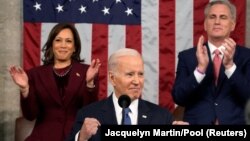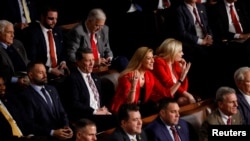Taking his message of unity Wednesday to Wisconsin, a state key to his likely 2024 reelection bid, U.S. President Joe Biden doubled down on his criticisms of Republicans, calling out by name those who had called him a “liar” during his State of the Union address Tuesday evening.
“Many of you have seen, we've had a spirited debate last night with my Republican friends,” he said, referring to the boos and jeers befalling upon him as he asserted that Republicans aim to sunset Social Security and Medicare, social programs cherished by supporters of both major parties.
“Marjorie Taylor-Greene and others stood up and said, ‘Liar, liar,’” Biden said, referring to the Republican representative from Georgia who heckled him repeatedly. He then laid out names of Republican lawmakers, including Florida Senator Rick Scott, Wisconsin Senator Ron Johnson and Utah Senator Mike Lee, and the instances in which they suggested cutting government spending on the programs that tens of millions of Americans depend on.
“Sounds pretty clear to me. How about you?” Biden, a Democrat, quipped before repeating what he concluded in his remarks following the outbursts — that Republicans now agree to protect Social Security and Medicare
“It looks like we negotiated a deal last night,” he joked.
The verbal jujitsu skills displayed amid Republican attacks and the decline in congressional decorum is a preview of the way Biden will conduct his expected reelection campaign in 2024, observers say.
“I do think President Biden was challenging or even ‘baiting’ Republicans to respond to him,” said John Fortier, a senior fellow at the American Enterprise Institute who focuses on Congress and elections. “House leadership had warned members to not take the bait, but the dynamic spiraled. The members who shouted out that the president was lying probably did not help their cause.”
Decades in 'the business'
With 50 years of political experience under his belt, Biden, now 80 years old, appeared to relish the exchange, grinning as he swiped back at Republicans. “We'll, I'm glad to see — I tell you, I enjoy conversion,” he said.
“It’s hard to say if the president was expecting that reaction, but he was certainly prepared for it. He’s been in this business for a long time,” said Jeff Bennett, professor and chair of communication studies at Vanderbilt University. “The president was arguing that he’s a reasonable person who is willing to reach across the aisle to get things done. And then the hecklers ended up providing the visual evidence he needed to support that claim.”
The heckling opponents appeared unruly and disrespectful of what is supposed to be an orderly American tradition that began with President Woodrow Wilson in 1913, observers noted.
“Ceremonial occasions aren't debate occasions, which is why congressional outbursts seem so out of place and indecorous,” Jennifer Mercieca, who teaches presidential rhetoric at Texas A&M University, told VOA. “Those outbursts aren't what the Greeks called ‘kairotic’ — the right time and place. it's not the right time nor the right place for debate.”
White House press secretary Karine Jean-Pierre contrasted lawmakers who behaved in a way that “Americans don’t want” with a president who “was very clear in how he sees the next two years.”
“He called out members on live television, in front of millions of Americans, and effectively put them on the defense,” she said in a briefing to reporters Wednesday.
Republicans are certainly defensive.
“We've made it clear from the beginning, we are going to honor our debt, we are going to protect our seniors. And furthermore, we're going to take care of our military personnel," Representative Andy Ogles of Tennessee told VOA. "And so for him to stand in the dais at the podium, and to make those accusations and really scare the American people was untruthful.”
Biden’s tone was “accusatory,” Ben Carson, secretary of Housing and Urban Development under the Trump administration, told VOA. “It really wasn't bipartisan at all.”
Decorum in decline
As Republicans heckled throughout the speech, including shouting calls to “secure the border,” many are noticing that these disruptions are now considered acceptable in American politics.
It’s a far cry from the condemnation lobbed by members of both parties when Representative Joe Wilson of South Carolina yelled “You lie!” during President Barack Obama’s 2009 speech to a joint session of Congress. Booed by his colleagues, Wilson, a Republican, later issued an apology to the president, a Democrat.
“Then, it was a single voice, and it was shocking,” Fortier noted. “Last night, it became almost a team back and forth, somewhat reminiscent of Prime Minister’s Question Time, with many voices calling back at the president,” he said, referring to the animated British parliamentary tradition when members of the House of Commons grill the prime minister, often in an unruly manner.
Biden will likely aim to disarm combative congressional Republicans with the same strategy of boxing them in a corner as he is set to again clash with lawmakers demanding spending cuts before agreeing to pass a debt ceiling hike to avoid the country from defaulting in a few months.
“I can’t imagine that’s how negotiations to the debt ceiling will play out, but this moment will be an important one in the coming months,” Bennett said. “This is all part of his strategy to show that he is a uniter who is willing to reach across the aisle to do the business of the American people.”
Bringing the parties together will not be easy. New polling from Ipsos shows that 70% of Americans believe the country is “far apart” on issues of government budget and debt. Eighty-one percent believe the country is far apart on the abortion issue, and 78% believe the country is far apart on immigration stances.
VOA Congressional Correspondent Katherine Gypson contributed to this report.







